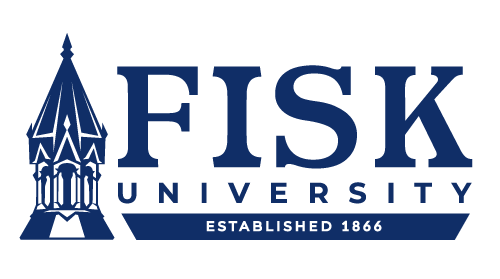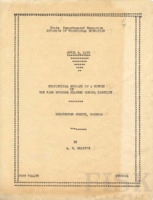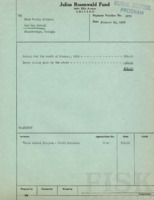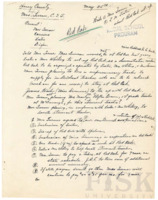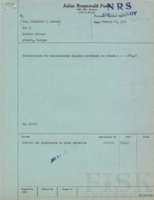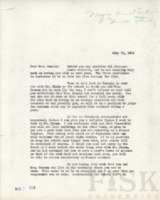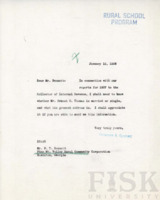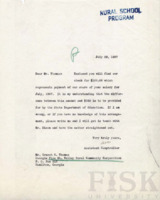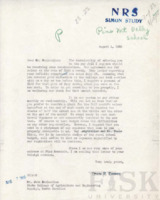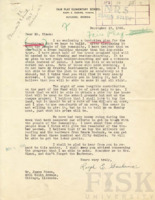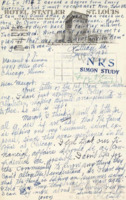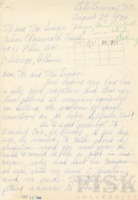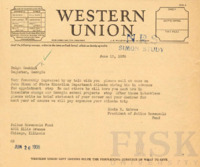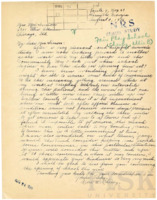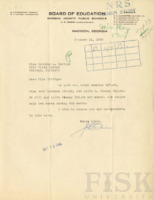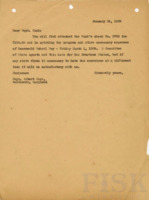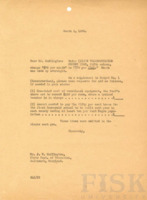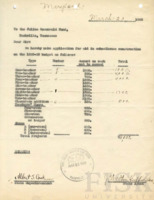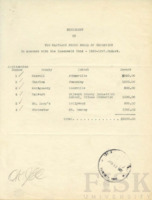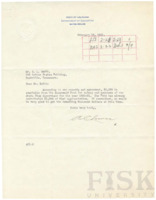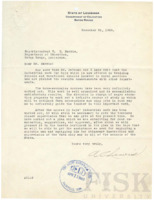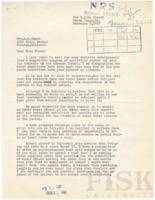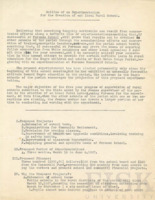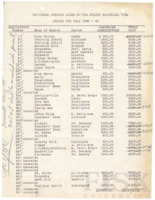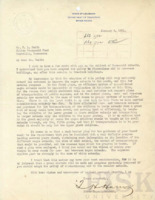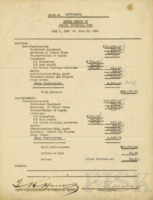Browse Items
SORT
Negro Rural Schools: Warm Springs, Georgia, 1934 - 1935
This collection contains correspondence between the Julius Rosenwald Fund, President Franklin D. Roosevelt and the White House, and the Georgia State Department of Education regarding the study of Negro schools and communities in the Warm Springs District of Georgia. Included in the collection is a report titled "Statistical Summary of a Survey of the Warm Springs Colored School District," written by Mr. L. S. Molette for the State Department of Education (Division of Vocational Education). Additionally, the correspondence features discussions between the Julius Rosenwald Fund and the White House concerning efforts to secure federal aid to supplement the Fund's existing resources for the construction of a Negro school in Warm Springs, Georgia. Key mentions in this collection includes Mr. Robert L. Cousins, Miss Gay B. Shepperson, and Mr. W. I. Nunn.
Rural School Program: Red Oak Schools, 1938 - 1939
This collection contains correspondence between the Julius Rosenwald Fund and the staff of Red Oak School concerning the operation of the school. Topics include salary payments for two teachers—Miss Larnie Johnson and Miss Juanita Reddick—the furnishing of the Red Oak teacherage, and discussions about the potential discontinuation of the Rosenwald Fund’s assistance to the school. Key individuals mention in this collection includes: Mr. James F. Simon, Mr. L. M. Lester, Mrs. Henrietta L. Turner, and Mr. R. L. Cousins.
Rural School Program: Red Oak Schools, 1937
This collection contains correspondence between the Georgia State Department of Education and the Julius Rosenwald Fund regarding the establishment of a two-teacher rural school in Red Oak, Georgia. The letters detail tentative plans for launching the school, teacher appointments, student enrollment data, and salary payments for Miss Juanita Reddick and Miss Larnie Johnson. They also address the condition and repair needs of the teacherage and updates on the construction of the Rosenwald cottage at Red Oak. Included in the collection is a three-page tentative plan outlining life-related educational activities for the Red Oak two-teacher rural school. It also features a document titled “An Experiment in Enrichment of Rural Living through Education” by Catherine Watkins Duncan, which reflects on her experiences at Red Oak and explores how the model could be replicated to enhance rural education in similar communities. Additionally, the collection contains excerpts from The Little Red School House magazine, which recounts the origins of the Red Oak News, and a copy of a children’s book titled “Soil, Our Best Friend,” written by Miss Larnie Johnson for second and third grade students at Red Oak School during the 1937–1938 school year. Key figures mentioned in this collection include Mr. L. M. Lester, Mrs. Margaret S. Simon, Mrs. Hugh J. Turner, Mr. James F. Simon, and Mrs. Henrietta L. Turner.
Simon Study: Red Oak School (Elizabeth P. Cannon and Catherine J. Duncan), 1935 - 1937
This collection contains payment vouchers, invoice records, receipts, and correspondence between two Rosenwald Fund explorers, Mrs. Elizabeth P. Cannon and Mrs. Catherine J. Duncan, and the Julius Rosenwald Fund regarding financial and construction expenses related to the Red Oak School project—specifically, materials purchased for building the teacherage. It also includes financial statements and payment vouchers for salaries, automobile expenses, and reimbursements made to both Mrs. Cannon and Mrs. Duncan. The correspondence provides detailed discussions on salary breakdowns, furnishing the teacherage, and ongoing updates about their work and experiences at Red Oak School. Key figures mentioned in this collection include Mr. James F. Simon, Mrs. Kate Bradfield Brown, Mrs. Margaret S. Simon, A. G. Matthews, Mrs. Henrietta L. Turner, Mrs. Hugh J. Turner, and Mr. L. M. Lester.
Negro Rural Schools (Simon Study): Red Oak School Teacherage, 1934 - 1935
This collection consists of correspondence between Mrs. Catherine J. Duncan and the Julius Rosenwald Fund regarding the arrangements for her arrival to begin work at Red Oak School, including finalizing the details of her compensation before she started. The collection also contains a handwritten document listing project materials for first through eighth grades, as well as materials related to agriculture, art, geography, world studies, health, home economics, and economic history. Additionally, the collection includes correspondence, building plans, and numerous financial documents—such as invoices, receipts, and payment vouchers—related to the construction of the teacherage and the furnishing of the school. Most of the materials were sourced from the Planters Warehouse and Lumber Company. It also contains payment vouchers reimbursing Mrs. Catherine J. Duncan for various supplies she purchased for the school. Key figures mentioned in this collection include Mrs. Margaret S. Simon, Mr. James F. Simon, Mr. H. D. Burbitt, Mrs. Elizabeth P. Cannon, and Mr. George C. Alexander.
Rural School Program: Pine Mountain Valley School, 1938
This collection contains correspondence between the Julius Rosenwald Fund, the Georgia State Department of Education, and the Georgia Pine Mountain Valley Rural Community Corporation regarding the discontinuation of financial cooperation with the Pine Mountain Valley Rural School. In response, Mr. Claude E. Boggs submitted an application to the Julius Rosenwald Fund requesting financial support to aid the school program for the next three years. He also pledged to send a supplementary report following Dr. Walter D. Cocking's visit to the school, in hopes of encouraging the Fund to renew its financial commitment to the rural school program. Additionally, the collection includes a payment voucher documenting the monthly salary of Mr. Claude E. Boggs, the superintendent of the Pine Mountain Valley Rural Community School. Key figures mentioned in this collection include Mr. W. T. Bennett and Mr. H. S. Burdette.
Rural School Program: Pine Mountain Valley School, 1937
This collection contains correspondence between the Julius Rosenwald Fund, the Georgia State Department of Education, and the Georgia Pine Mountain Valley Rural Community Corporation concerning efforts to appoint a new principal for the Pine Mountain Valley School following the resignation of Mr. Ernest H. Thomas. Ultimately, Mr. Claude E. Boggs is selected to succeed Mr. Thomas as the teacher of vocational agriculture and superintendent of the Pine Mountain Valley Rural Community School. The collection also includes copies of the P.M.V. Echo, a magazine published weekly by the Pine Mountain Valley Rural Organized Community in Hamilton, Georgia, specifically the August 7, 1937, and August 28, 1937, issues. Additionally, the collection contains an application for financial aid submitted to the Julius Rosenwald Fund by the Pine Mountain Valley Rural School to support a demonstration project in rural education. It also contains a list of activities and accomplishments of Pine Mountain Valley Rural Organized Community. Key mentions in this collection include Mr. W. T. Bennett, Mr. M. D. Mobley, Mr. L. M. Lester, and Mr Wiley B. Wisdom.
Simon Study: Pine Mountain Valley School, 1935 - 1937
This collection consists primarily of correspondence between the Julius Rosenwald Fund, the Work Progress Administration of Georgia, the Georgia State Department of Education, and individuals from the Georgia Pine Mountain Valley Rural Community Corporation regarding the renewal of a $3,000 funding commitment to the Pine Mountain Valley School in Georgia to support rural education. It also includes discussions concerning the selection and salary payment of a principal for the school, ultimately resulting in the appointment of Mr. Ernest H. Thomas to the position. Key mentions in this collection include Mrs. Margaret S. Simon, Mr. W. T. Bennett, Mr. Raymond Paty, Miss Gay B. Shepperson, Mr. M. D. Mobley, and Mr. Wiley B. Wisdom.
Simon Study: Fair Play School (Teacherage), 1935 - 1937
This collection contains correspondence, expenditure statements, payment vouchers, billing documents, and architectural plans related to the construction of a teacherage at Fair Play School. It also includes correspondence between Mr. Ralph E. Gaskins, one of the Julius Rosenwald Fund explorers at Fair Play, Georgia, and the Julius Rosenwald Fund, detailing updates and progress on the teacherage construction project. Key mentions in this collection include Mr. James F. Simon, Mr S. L. Smith, Mrs. Margaret S. Simon, Mr. H. A. Glass, Mr. J. Clyde Seale, and Mr. J. E. Owen
Simon Study: Fair Play School (Ruth Lockman), 1936 - 1937
This collection contains correspondence and handwritten letters between Miss Ruth Lockman, Mr. James F. Simon, and Mrs. Margaret Simon regarding updates and ongoing matters related to Miss Lockman’s work on rural education at Fair Play School, Georgia. The letters include discussions about initiating a summer school program and updates on plans to construct a teacherage at Fair Play School. Additionally, the collection features correspondence between Miss Lockman and the Julius Rosenwald Fund concerning her request for a salary increase, as she had received more competitive offers elsewhere. It also includes letters discussing the Fund’s decision to discontinue its support of the Fair Play School project, which prompted Miss Lockman to pursue a position at the Ashwood Plantation Project in South Carolina. Furthermore, the collection includes a copy of an invitation letter addressed to Miss Lockman, inviting her to attend an interracial small conference hosted by the Young Women’s Christian Association (YWCA). It also contains a copy of the book titled "The People of an American Folk School", which focuses on the John C. Campbell Folk School in Brasstown, North Carolina, and features multiple photographs taken by Doris Ulmann.
Simon Study: Fair Play School (Ruth Lockman), 1934 - 1935
This collection contains correspondence and handwritten letters between Miss Ruth Lockman, Mr. James F. Simon, and Mrs. Margaret Simon regarding updates and ongoing issues related to Miss Lockman’s work on rural education at Fair Play School, Georgia. Additionally, it includes correspondence between Ruth Lockman and Edwin R. Embree discussing the selection of Ralph Gaskins over other candidates to assist with the work at Fair Play School and in the community, as well as other aspects of her efforts in the area.
Simon Study: Fair Play School (Ralph E. Gaskins), 1935 - 1937
This collection contains correspondence between Mr. Ralph E. Gaskins, Mr. James F. Simon, Mrs. Margaret S. Simon, and Mr. Edwin R. Embree regarding Gaskins' appointment to work on the Georgia school projects. Specifically, the letters discuss his role alongside Miss Ruth Lockman and Mr. J. E. Owen, the superintendent of Morgan County Public Schools, at Fair Play School for the upcoming school year. Additionally, the collection includes correspondence between Gaskins and the Julius Rosenwald Fund concerning building plans for setting up a teacherage at Fair Play School, acquiring a car, his salary payment schedule, and his plans during and after the school year at Fair Play School, Georgia.
Simon Study: Fair Play School (Allie B. Cheney), 1936 - 1937
This collection contains correspondence between Allie B. Cheney, a teacher and researcher at Fair Play School for the Simon Study, Margaret S. Simon, and the Julius Rosenwald Fund. The letters discuss matters such as her salary payment and efforts to facilitate her work at Fair Play, including the purchase of an automobile to improve convenience and mobility.
Simon Study: Fair Play One-Teacher Experimental School, 1935 - 1937
This collection contains correspondence between Mr. J. E. Owen, the superintendent of Morgan County Public Schools in Georgia, and the Julius Rosenwald Fund regarding the payment of salaries for Mr. Ralph Gaskins, Miss Ruth Lockman, and Allie Cheney. Additionally, it includes correspondence between Dr. Edwin R. Embree and Mrs. G. G. Adair of the Fair Play Woman's Club, in which she expresses appreciation for the Fund's work at Fair Play School and within the community while also requesting assistance to build a teacherage for the school. The collection also contains a copy of an itinerary series for the Fair Play One-Teacher Experimental School as part of the Simon Study. This document covers subjects such as the Report of Visit to Fair Play and Monticello and Fair Play One-Teacher Experimental School. Furthermore, the collection includes a document titled "Fair Play Negro School and Community 1935–1936", written by the State Department of Education, Division of Negro Education, in Atlanta, Georgia, for the Simon Study. The document is structured into the following sections: The Situation, The Problem, Procedure, Conclusion, The Teacher's Observation, Subject Matter Adapted to Rural Life (Fair Play Community), and Samples of Children's Work at Fair Play Negro Experimental School (including language, writing, and spelling based on social studies, agriculture, and science). Additional sections include Appendix, The Teacher Finds a Place to Live, The Teacher Studies Fair Play Negro Community, Tabular Study of Homes of Fair Play Negroes, Superstitions Common to Negroes in Fair Play, Cumulative Inventory of Negro Pupils of Fair Play (A Study of One Pupil), Graphs, and Pupils' Part in Creating a Livable Environment. There is a copy of another document titled Supplement to Fairplay Curriculum Study Being an Appraisal and Suggestions made by Benjamin F. Bullock.
Correspondence and Reports on Financial Aid, and Rosenwald School Day in Maryland.
This collection contains correspondence, reports, and financial information related to the Rosenwald School Day program and financial aid for Rosenwald schools and teachers' homes in Maryland between the Julius Rosenwald Fund and the Maryland State Department of Education, ranging from 1929 and 1932. This collection contain information on the organization and reporting of Rosenwald School Day events in Maryland, including the number of participating schools, teachers, students, community attendees, money raised, as well as scoring sheets and reports for schools in various counties. The collection also includes financial records of Rosenwald Fund contributions towards the construction of various types of schools and teachers' homes in different counties of Maryland, and records of disbursements for school libraries.
Correspondence Containing Financial Information on Rosenwald Schools in Maryland
This collection contains correspondence, budget requests, financial reports, and applications for aid between the Julius Rosenwald Fund and the Maryland State Department of Education, ranging from 1931 to 1932, specifically concerning financial assistance for the construction of Rosenwald schools for African American students in Maryland. The collection includes information related to aid for the extension of school terms, transportation of pupils (buses), and school libraries (elementary and high school). Also, there are financial statements detailing receipts and disbursements of Rosenwald Fund money by the Maryland State Board of Education for various purposes, including construction, libraries, transportation, and vocational equipment. There is also correspondence regarding the remaining funds from the Rosenwald Rural School Program ranging from 1939 to 1945.
Documents Containing Information on Financial Aid for Rosenwald Schools and Libraries in Maryland
This collection contains correspondence, application for financial aid, budget information, financial reports, and lists of disbursements between the Maryland State Department of Education and the Julius Rosenwald Fund between 1928 and 1930. The collection also includes information on financial aid for rural school libraries and discussions for potential high school libraries. Other documents contain financial support for the Rosenwald Day Program, transportation of students and the work of Rosenwald Building Agents.
Correspondence on Finances and School Construction in Maryland
This collection contains statements of accounts, budgets, and correspondence between the Maryland State Board of Education and the Julius Rosenwald Fund from 1921 to 1927. The documents include budget information outlining number and types of schools to be built, allocation of funds, request for funds, and contributions towards constructions of rural schools and teachers homes. There is also correspondece containing information on disbursement and replenishment of working capital, acknowledgement of checks, and reports of expenditure for completed school buildings.
Correspondence Pertaining to the State Shop Supervisor in Louisiana
This collection contains various correspondence and reports between the Louisiana State Department of Education and the Julius Rosenwald Fund concerning the State Supervisor of Shop Work in Louisiana from 1931 to 1932. The collection also contain financial reports, disbursements of funds, funds requests, and payment vouchers issued by the Julius Rosenwald Fund.
Correspondence and Plans Pertaining to the Supervision of Farm Shop Work in Louisiana
This collection contains correspondence, plans and information related to the establishment of a farm shop work in Louisiana. The correspondence is between the Louisiana State Department of Education and the Julius Rosenwald Fund, as well as the General Education Board. The correspondence include a plan outlining a coorperative effort between the State and the Rosenwald Fund to finance a supervisor to travel between schools and supervise the farm shop activites, budgets for the schools in Louisiana, and financial reports with receipts and disbursements for the Rosenwald Shop Supervisor. The correspondence ranged from 1928 to 1930.
Correspondence Pertaining to the Foreman Rosenwald School Experimentation Program.
This collections comprises correspondence and reports on the Foreman Rosenwald School in East Baton Rouge Parish in Louisiana. The documents include correspondence between a teacher in the school and the Julius Rosenwald Fund, on financial support. The collection also details plans for the experiment in the school, as well as budgets and expenditure for various other projects in the school.
Outline of an Experimentation at Foreman Rosenwald School and Related Correspondence.
This collection contains an outline of a proposed five-year experimentation program for the creation of a Rosenwald School in East Baton Rouge Parish, Louisiana. The outline details proposed projects including the extension of the school term, organizations for community betterment, evening classes, health and hygiene improvement, classroom instruction enhancement, and addressing the general needs of the Foreman School. The collection also includes correspondence between the Julius Rosenwald Fund, and various people in Louisiana, talking about the Foreman Rosenwald School. The correspondence discuss school visists, the condition of the school grounds, and library, selection of library books, fellowship applications, and salary payments. The correspondence were from 1934 through 1936.
Reports on Rosenwald Schools in Louisiana for Rosenwald School Day
This collection contains a number of reports for the Rosenwald School Day Program for schools in various counties and parishes in Louisiana prepared by the Louisiana State Department of Education for the Julius Rosenwald Fund. The collection also contains Summary Reports and School Report and Guide for Scoring for inspection for Rosenwald Schools.
Various Documents on Funding and Correspondence between The Julius Rosenwald Fund and the Louisiana State Department of Education
This collection features various correspondence between The Julius Rosenwald Fund and the State Department of Education comprising information on funding, various reports on Rosenwald Schools, budgets, checks, refund checks, inspection reports and disbursements (for extension of terms, transportation of pupils, libraries, and construction). The correspondence were all in 1931.
Reports of Schools in Counties in Louisiana
This collection contains various correspondence to and from the Julius Rosenwald Fund and the Louisiana State Department of Education comprising receipts and disbursements of funds, checks, annual reports on the Julius Rosenwald schools, applications for aid, budgets, receipts, and disbursements. The correspondence were all in 1930.
